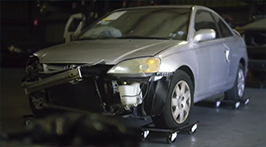An earthquake can occur at any time of the year without warning when rock beneath the earth’s surface suddenly breaks or shifts. Nearly every region of the United States is at risk for earthquake activity, with as many as 24 states categorized as “high” or “very high” risk by the U.S. Federal Emergency Management Agency (FEMA).
Worldwide, earthquakes occur every single day, sometimes as often as 1,000 times per day in the case of minor earthquakes, but many earthquakes are not strong enough to cause significant damage.
Damage usually occurs when an earthquake’s magnitude is above a 4 or a 5 on the Richter magnitude scale. According to the U.S. Geological Survey National Earthquake Information Center, there were more than 4,000 earthquakes of magnitude 4.0 or higher in the United States from 2000 to 2009, with an average of more than 14,000 earthquakes of magnitude 4.0 or higher occurring worldwide each year.
High-Risk Areas
According to FEMA, the U.S. states with a “very high” risk of earthquake activity include Alaska, California, Commonwealth of Northern Mariana Islands, Guam, Hawaii, Idaho, Montana, Nevada, Oregon, Virgin Islands, Washington, and Wyoming.
States with a “high” risk of earthquake activity include American Samoa, Arizona, Arkansas, Illinois, Indiana, Kentucky, Missouri, New Mexico, Puerto Rico, South Carolina, Tennessee, and Utah.
Many countries are considered high-risk areas for seismic activity, including Chile, Haiti, Mexico, India, Japan, Indonesia, China, Russia, Peru, New Zealand, and Iran, as well as many others.
Earthquake Damage
Earthquakes are felt by the ground or floor moving, perhaps violently, and a rolling sensation like ocean waves may be felt if the center of the quake is not far away. Sometimes, a loud bang or a roaring sound is heard during an earthquake.
An earthquake registering a 4.0 or higher on the Richter magnitude scale can cause noticeable damage to buildings and infrastructures, with the following damage often occurring:
- Light fixtures falling
- Broken windows
- Large appliances sliding around
- Bookcases, shelving, or furniture toppling over
- Landslides
- Flooding
- Tsunamis
Surviving an Earthquake
With careful preparation and planning, you can increase your chances of surviving an earthquake and help minimize damage to your home. The following tips can help you and your family to survive an earthquake, both before and after the earthquake activity reaches your area.
Before:
- Gather emergency kit supplies, including a fire extinguisher, medications, first aid kit, flashlights, portable radio, enough water for at least two weeks, enough non-perishable food for three days, can opener, camp stove, and plastic bags for waste
- Know how to shut off your home’s gas, electricity, and water supplies
- Take Red Cross First Aid and CPR training courses
- Inspect the house for furniture or items that could fall over or slide easily
- Install door latches, braces, and fasteners to secure items and top-heavy furniture, shelving units, the water heater, and other heavy appliances
- Avoid hanging heavy items above beds
- Close curtains and blinds to keep window glass from falling onto beds in the case of an earthquake
During (if inside):
- Stay inside
- Do not use matches, lighters, stoves, or appliances until you are sure there is no gas leak
- Practice the duck, cover, and hold procedure (seek shelter under a sturdy piece of furniture such as a table, desk, or bed and cover your head and torso)
- Stay away from windows, shelves, doorways, doors, tall furniture, light fixtures, elevators, and other potentially dangerous situations
During (if outside or driving):
- Stop your car and move far from traffic while remaining in your car
- Never stop under a bridge, overpass, trees, light posts, power lines, or signs
- Get into open areas away from buildings, chimneys, or other large structures
- Beware of failing rocks, landslides, trees, coastlines
- Avoid downed power lines
After:
- Expect aftershocks
- Check for injuries and seek medical attention for serious injuries
- Inspect house for fire hazards, gas leaks, damage to electrical wiring, downed power lines, chemical spills, fallen items, and shattered glass
Sources:
